
Ensuring your pet’s joints and bones remain healthy is crucial for their overall well-being. By implementing a few key practices, you can significantly improve their quality of life and longevity. From nutrition to exercise and regular check-ups, each aspect plays a vital role in maintaining their joint health. But what are the specific steps you can take to safeguard your furry friend’s mobility and comfort throughout the years?
Proper Nutrition for Joint Health
To maintain your pet’s joint health, ensure their diet includes essential nutrients like glucosamine and omega-3 fatty acids. These nutrients play a crucial role in supporting your pet’s joints, reducing inflammation, and promoting overall joint function.
Glucosamine is known for its ability to help repair cartilage and keep joints flexible, which is especially important for pets prone to joint issues like arthritis. Omega-3 fatty acids, commonly found in fish oil, have anti-inflammatory properties that can help alleviate joint pain and stiffness in your furry friend.
When selecting pet food or supplements, look for options that specifically mention glucosamine and omega-3 fatty acids in their ingredients. These additions can significantly benefit your pet’s joint health in the long run. Additionally, consider incorporating natural sources of these nutrients into your pet’s diet, such as fish, flaxseed, or joint health treats specially formulated to support mobility and flexibility.
Regular Exercise and Playtime
Keeping your pet active through regular exercise and playtime is essential for maintaining their joint health and overall well-being. Exercise helps to strengthen muscles, which in turn supports the joints and reduces the risk of injuries. Regular physical activity also helps to manage your pet’s weight, which is crucial for joint health. Engaging in playtime activities like fetch, tug-of-war, or interactive toys not only provides physical exercise but also mental stimulation, keeping your pet happy and healthy.
When planning your pet’s exercise routine, consider their age, breed, and any existing health conditions. Younger pets may require more high-energy activities, while older pets may benefit from gentler exercises like short walks or swimming. Be mindful of the weather conditions when exercising outdoors and adjust the intensity and duration of the activities accordingly.
Make exercise and playtime a fun bonding experience for you and your pet. Regular physical activity won’t only improve your pet’s joint health but also strengthen your relationship and create lasting memories together.
Weight Management Tips
Maintaining an optimal weight for your pet is key to supporting their joint health and overall well-being. Excess weight puts unnecessary strain on your pet’s joints, leading to increased wear and tear over time. To help manage your pet’s weight, start by feeding them a balanced diet with the right amount of calories for their age, size, and activity level. Avoid overfeeding and limit treats to prevent weight gain. Additionally, ensure your pet gets regular exercise to burn calories and maintain muscle strength, which is essential for supporting their joints.
Monitoring your pet’s weight regularly is important to catch any fluctuations early on. If you notice your pet gaining weight, consult your veterinarian to create a tailored weight management plan. Remember, a healthy weight not only benefits your pet’s joints but also contributes to their overall quality of life. By keeping your pet at a proper weight, you’re helping them stay active, happy, and comfortable throughout their life.
Joint Supplements and Treatments
Ensuring your pet’s joint health can be supported through the use of appropriate joint supplements and treatments. Joint supplements like glucosamine and chondroitin can help maintain healthy cartilage and reduce inflammation in your pet’s joints. These supplements are available in various forms such as chewable tablets, powders, or liquid formulations, making it easier to administer based on your pet’s preferences.
Additionally, incorporating omega-3 fatty acids into your pet’s diet can also aid in reducing joint inflammation and promoting overall joint health. Foods rich in omega-3s or fish oil supplements can be beneficial for pets with arthritis or joint stiffness.
In more severe cases of joint issues, treatments such as physical therapy, acupuncture, or laser therapy may be recommended by your veterinarian. These treatments can help alleviate pain, improve mobility, and enhance the overall quality of life for your pet.
Remember to always consult with your veterinarian before starting your pet on any new supplements or treatments to ensure they’re safe and appropriate for your pet’s specific needs.
Routine Veterinary Check-ups
Regular veterinary check-ups play a crucial role in monitoring and maintaining your pet’s overall health and well-being. These routine visits allow veterinarians to assess your pet’s joint and bone health, catching any issues early on. During these check-ups, your vet can conduct physical examinations to check for signs of arthritis, joint stiffness, or other musculoskeletal problems. They may also recommend specific preventive measures or treatments to keep your pet’s joints and bones healthy.
In addition to physical exams, routine veterinary check-ups often include discussions about your pet’s diet, exercise routine, and lifestyle factors that can impact their joint and bone health. Your vet can provide tailored advice on how to optimize these aspects of your pet’s care to promote strong bones and joints throughout their life. Regular check-ups also give you the opportunity to ask any questions or address concerns you may have about your pet’s musculoskeletal health. By staying proactive with these visits, you can help ensure your pet enjoys a comfortable and active life.Please choose display type!









